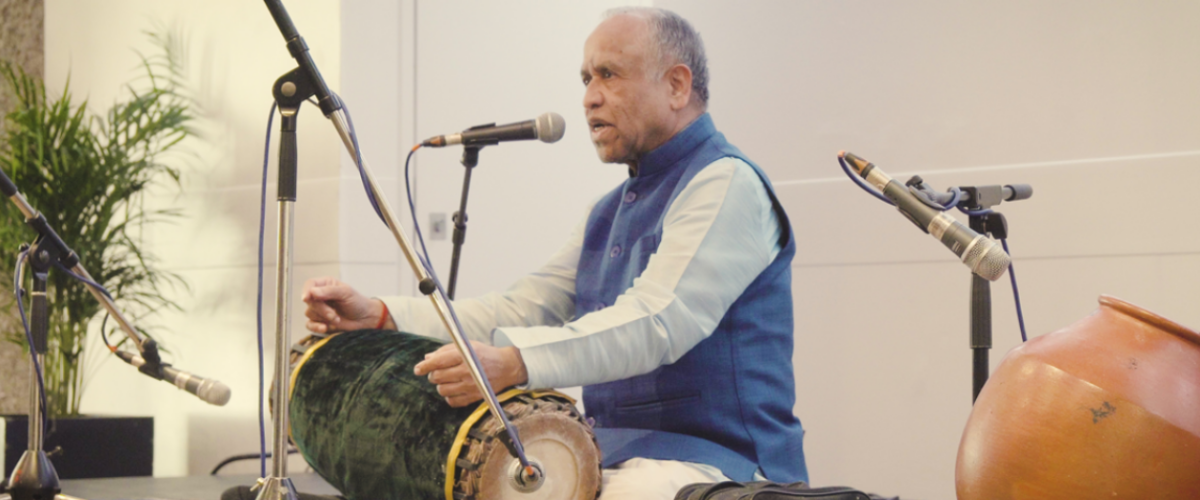

One of the most ancient drums of India, the mridangam, which literally means ‘body of clay,’ originated in South India. To this day it remains the leading percussion accompaniment for Carnatic music – vocal and instrumental – as well as for all South Indian classical dance forms. A double-headed barrel-shaped drum, it is capable of producing an astonishing variety of sounds and tones, allowing for poetic, lyrical playing.
As its name suggests, it used to be made of clay but is now usually made of a single, hollowed-out piece of wood. While it also served as the prototype for the North Indian pakhawaj, which is thought to have evolved at a later stage, the mridangam is smaller and slimmer than its descendant, capable of producing more finely nuanced tones.
The left-hand (bass) side is covered with two layers of skin and has a centre covered in a paste of boiled rice, manganese filings and water which has to be applied freshly for each performance. It is this mixture that enables the drum to produce a very deep, richly resonating sound. The treble side, usually played with the right-hand, is smaller and has three different layers of skin. It also has a centre covered with paste but, unlike the bass-side, this is permanently fixed.
The mridangam is one of India's heaviest drums and the playing technique consequently differs considerably from the pakhawaj. The mridangam player also sits cross-legged, but with one leg slightly extended outwards and the instrument balanced on the ankle of this leg, which is cushioned with a wad of cloth. A similar drum known as a khol is used in the Indian state of Bengal, mainly for the accompaniment of devotional folk music, but is usually played standing up, strung around the neck of the player.
In ancient Hindu paintings and sculpture, the mridangam is often depicted as the preferred instrument of the deities, notably Lord Ganesh, known as the the ‘remover of obstacles'. It was also the mridangam, played by Lord Shiva’s companion, the bull-god Nandi, which was said to cause "a divine rhythm to resound in the heavens" during Shiva’s famous tandav dance of creation, earning it the epithet of deva vadhyam (divine instrument).
Listen to the music | Neyveli B Venkatesh is a Chennai-based mridangam player, renowned for superb solo performances. Here he stretches the 8-beat Adi Tala to its limits - recorded by Darbar on location in Mahabalipuram, Tamil Nadu.
Jameela Siddiqi is an author, linguist, and BBC cultural commentator, specialising in postcolonial fiction and the devotional music of South Asia.
Darbar believes in the power of Indian classical music to stir, thrill, and inspire. Explore our YouTube channel, or subscribe to the Darbar Concert Hall to watch extended festival performances, talk and documentaries in pristine HD and UHD quality.
The veena, also known as the been in North Indian languages, is a large plucked lute. It is undoubtedly one of...
Read More 
The lifeblood of all Indian classical music, whether Hindustani (North Indian) or Carnatic (South Indian), is the...
Read More 
Carnatic music's wealth of powerful, highly developed ideas deserves far more global attention. Here's an in-depth...
Read More 
The beginner's guide to Indian classical music. Whether you’re completely new to raga music or just need a refresher, we’ve put together this brief overview of all things raga music to help you feel at ease when visiting one of our concerts or watch our videos on our YouTube or our Darbar Concert Hall.
Keep up to date with the latest news, events, music and musings across our social channels
For hundreds more clips and shorts, vist our YT page here 